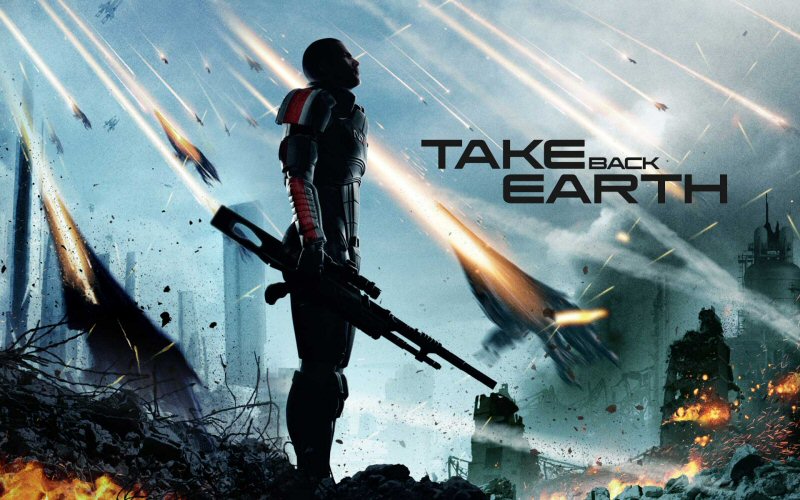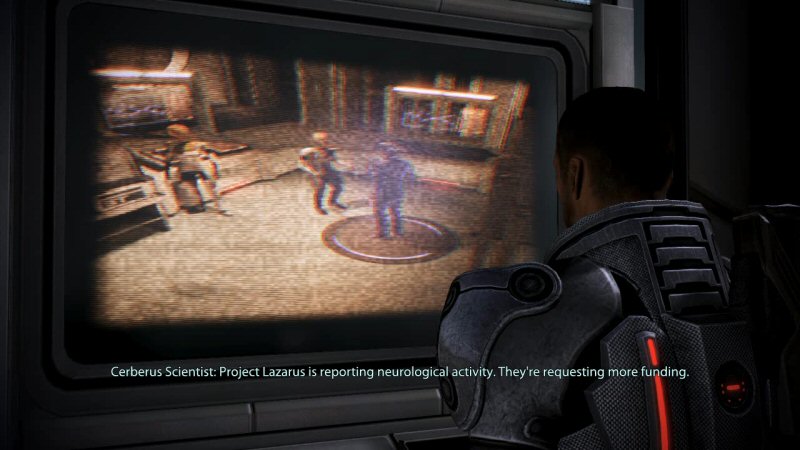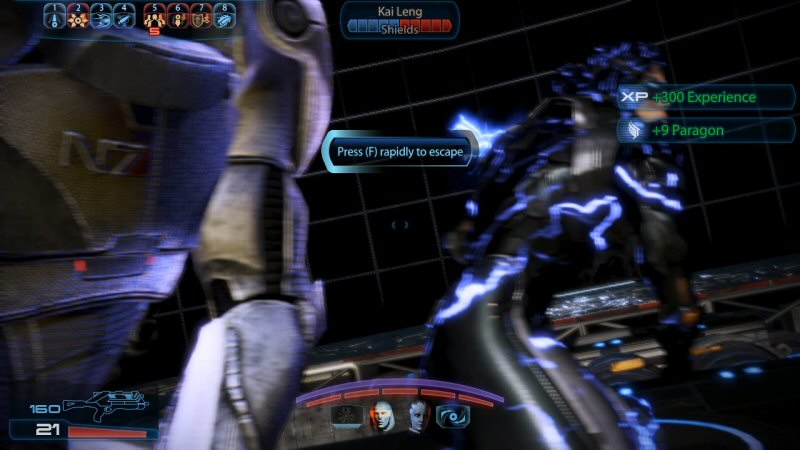Mass Effect Retrospective 47: Space Magic Nonsense
We were all prepared for some exposition that would explain what the Crucible is, what the Catalyst is, and how it can beat the Reapers. We found the VI on Thessia, but before it could tell us anything useful Kai Leng showed up and stole it in a cutscene.
Kai Leng has a gunship protecting him. Apparently the writer totally forgot that the Reapers were blowing the hell out of the planet and that gunships were getting shot down in droves. I guess that doesn’t apply to Kai Leng? He can just stroll in here without being killed by either the Reapers or the Asari military?
“But Shamus, Kai Leng is indoctrinated so the Reapers leave him alone!”
That’s certainly an explanation a writer could have put in the game if they had the ability to think about more than one concept at a time. But this is a one-concept writer who tried to write a three-way fight, which leaves the rest of us to patch over the gaps and holes with conjecture. And if you head-canon that excuse in this scene, then the very next mission destroys that notion by showing the Reapers attacking a Cerberus base. It’s not so much “The Reapers won’t attack Cerberus” as “The Reapers only attack Cerberus when it’s convenient for the writer”.
After the big “Kai Leng Wins The Whole Universe Because He’s the Best” cutscene, everyone gathers on the Normandy to discuss their next move. James of all people – who I realize I’ve never covered in this write-up but he’s our meathead space marine squaddie – asks why we don’t hit Cerberus back.
That’s a Really Good Question
Really? This is a new idea? Up until this point I’ve assumed Cerberus was simply “hidden” – you know, the way one might hide all of Texas – so that we couldn’t find them. But now the game seems to be suggesting that Cerberus does indeed have bases. And nobody in the entire galaxy has ever gotten the idea to find these bases and blow them up? Really? Apparently so, because it takes just one person to track them down, and she does it without leaving the meeting or even using a computer.
Look, if they’re impossible to find, that’s ridiculous because they have armies that rival the council races so their burgeoning infrastructure should be trivial to find. But if they’re trivial to find, then why haven’t any of their enemies done so, since they have been going out of their way to pick fights with basically everyone? Not only is the game telling us two contradictory things about Cerberus, but both of these contradictory ideas are completely nonsensical. The writer can’t even keep track of which nonsensical bullshit excuse they’re using at any given moment.
Sure, you
could make this work. This could be sloppily patched over by saying Cerberus is hiding in some politically difficult area, or they have a secret Mass Relay, or some cloaking bullshit, or a nebula, or some other lame excuse. Heck, at least make it sound like the Alliance has been actively looking for Cerberus bases and shutting them down whenever possible. You could say that Cerberus bases are like drug dealers: Remove one, and another one replaces it. It would still be dumb, but it least it would show that somebody in this universe was
doing something. It would show that there are people in this universe who make decisions and do things, even if they’ve never met Commander Shepard.
But the writer never bothered because the main plot of Mass Effect 3 runs on contrivances and idiocy. The writer has extreme tunnel vision and can’t imagine the parts of the world that aren’t directly in front of them. Cerberus has been our most direct antagonist in the game, and until now we’ve never been given the impression that anyone in the story was doing something about them, or that anyone had ever tried.
Sanctuary
Fun trivia: This takes place on the same planet as
the Horizons mission for Mass Effect 2. So that’s TWICE we’ve been here without meeting anyone or experiencing any worldbuilding.
One strange thing that the game keeps doing is that it repeatedly has our heroes react with shock when it’s revealed how stupid and pointlessly evil Cerberus is. I thought Cerberus was stupid and evil at the very opening of Mass Effect 2. The game then proceeded to show us many instances that could only reinforce this perception. Then Cerberus went into full-on antagonist mode at the start of Mass Effect 3. And yet for some reason our characters still continue to be surprised at this, as if this idea is wholly new to them.
Shepard, do you remember Mass Effect 2? Jack’s loyalty mission? The science team on the derelict Reaper? The part of your own backstory where Cerberus fed your squad to a Thresher Maw? The Mars base at the start of this game where Cerberus murdered all our scientists and tried to erase the Prothean data? The bullshit you just saw on Thessia? It’s long past time to stop being shocked.
The only shocking reveal here is the scope and scale of the endless Cerberus military might. Instead of having Liara ask, “How could The Illusive Man do this?!” someone should be asking, “Where is this clown getting all his ships and weapons?”
This base shows that The Illusive Man is researching indoctrination by taking war refugees and turning them into husks by the thousands. That sort of explains the size of his ground army, but unless he’s “indoctrinating” shipyards, factories, and steel mills then Cerberus is still a cartoon villain that runs on fairy dust and unicorn dung.
At the end of Sanctuary we face off against Miranda’s father, who is holding her sister hostage. Once that’s resolved, we’re given the location for the main Cerberus base. And here I want to stop nitpicking and ask an honest non-rhetorical question:
Why couldn’t we have obtained this information from Miranda after she betrayed Cerberus? We know she’s been to that base, because she was there in the opening cutscene of Mass Effect 2. I’ve never had Miranda survive the suicide mission[1], so I don’t know if this was explained or not.
I’ve always been left with the feeling that I’m missing something here, and I was never sure if that was an actual problem with the story, or if I was missing key exposition due to missing Miranda[2]. So I don’t have more to say on this mission. Let’s just move on to…
The Cerberus Base
There are a couple of good moments in the Cerberus base. Shepard finds out just how dead he was, and begins asking what it means to come back from that. Granted, this introspection is about 1 ¾ games too late, but it’s a nice gesture.
You also find the ruins of the baby Reaper from Mass Effect 2. This happens even if you destroyed the entire base in a nuclear explosion. The only reason people wanted to blow up the base at all is to keep Cerberus from having it, and yet here it is. Somehow.
Why? Why would the writer negate the big end-game decision like this? It’s not like this Reaper tech is required to make the story work[3]. Why would you spend money on scripting and voice acting and environment design to put this scene in the game, when the only thing it accomplishes is to undo a rare moment of player agency? And for what? To remind us of the lame terminator robot that we would have been happy to forget about? It is amazing the lengths the writer is willing to go to in order to do the wrongest thing possible.
Then at the end you have another conversation with TIM. Like all your other debates with him, it goes in circles and comes down to cliches rather than an exchange of viewpoints. He even claims that Cerberus is an “idea”, and then refuses to say what that idea is. Once again, it’s clear that our dialog choices cannot persuade TIM and that he’s not going to tell us anything interesting. It’s an argument about nothing, and this is the third time we’ve had to sit through it.
Afterwards, we recover the Prothean VI, who will hopefully make sense of the Crucible for us.
It’s Dumber than You Could Have Guessed
The VI reveals that the Crucible was developed over many cycles by many different species. Each species finds the plans and adds to them, but nobody has yet used the plans to defeat the Reapers. The “Catalyst” we’ve been looking for – the last piece of the Crucible – is the Citadel itself. I picked this idea apart
way back in 2012, but for those that missed it:
How are the races collaborating? The Reapers surprise attack, kill everyone, and then leave no traces of their work. Does every single race just happen to never find any hint of the Reapers until after the Reapers attack? And then once the attack is begun they find ruins, or old computers, or whatever, and try to build their own Crucible, even though nobody knows how to use it or what it’s for? And then they somehow
add to this design, even though they don’t know what it does or how it works? And then they bury their modified plans in such a way that the Reapers
won’t find them, but the people of the next cycle
will find them, but only once it’s too late? And the Reapers have never heard of this idea, even though they must have destroyed previous versions of the Crucible, and even though espionage through indoctrination (literal mind-control!) is a major tool of their invasion?
Imagine that the first race, facing the Reaper threat and having no idea how to defeat them, sits down and designs a trigger guard. And that’s it. Then they bury the plans for the trigger guard and they die. 50,000 years later, the next race is getting pulverized. Before they die, they find the plans for the trigger guard. They have no idea what it’s for or what it does, but they design a handle to go with it. They add it to the plans, and re-bury them.
And so it goes. 50,000 years. A safety mechanism. A rifled barrel. A magazine. A rear sight. The trigger. A front sight. A muzzle. An ejection port. Nobody knows what any of this does.
Then Shepard & Co come along. They follow the plans, which builds a Glock 17 pistol. Admiral Hackett points to the chamber. Something goes in there, but we don’t know what it is or what it does.
Then you meet the Star Child, who just happens to be a 9mm bullet, which miraculously is a perfect fit for this pistol, even though the people who built it have no idea what a bullet is or what it does.
Then the Star Child explains that the next step is to put the bullet in the chamber, aim the weapon at your foot, and pull the trigger. That’s how you “win”.
Actually, I think my explanation makes the setup sound cooler than it really is. A situation where you’re tricked into building the weapon of your own downfall would have been a great twist. This isn’t that. This is just a mess of contrivances and bizarre “plot twists” trying to sound profound. This isn’t just a couple of annoying plot holes. This entire concept is nonsensical to the point of being surreal. This device is at the very center of this story. The entire plot turns on this thing. And it’s complete horseshit.
The Mass Effect universe was originally named after the technology that makes all space travel possible. A large part of the first game was spent establishing rules, technology, history, and political relationships of numerous peoples and factions. And yet here at the end, the entire plot revolves around a device of unknown purpose with a nonsense history with no connection to our hero that – even if it worked on a logical level – is still nothing more than a brute-force deus ex machina.
At the end of the conversation, the VI reveals that TIM has fled to the Citadel and alerted the Reapers to the plans to use the Crucible.
Wait, What?
Why would TIM do this? It only jeopardizes his plans! If he hadn’t said anything, then presumably the Crucible could have been taken to the Citadel and deployed without incident. By telegraphing your plans, TIM made it far more likely that the Crucible would be destroyed.
We now have a three-way war in which nobody makes any sense:
The Reapers usually attack the Citadel first. The first game established this. It’s where galactic power is focused. It’s the center of all intelligence, leadership, communication, and also
the entire mass effect relay network. Capture it, and the galaxy falls apart, making conquest much easier. But the Reapers decided to ignore this and attack homeworlds first, and the writers didn’t offer an explanation. Heck, they didn’t even lampshade it. Shepard never says, “I wonder why they changed tactic this time around? Why did they leave the Citadel alone?”
They spent the entire second game messing around building a terminator robot that didn’t advance their goal of galactic conquest. The entire first game was built around the idea that they were trapped in dark space, asleep. And then they just woke up for no reason at the end of the second game, and showed up for no reason at the start of the third.
Cerberus / TIM spends the entire game trying to thwart your plans, despite the fact that his plan requires your plan to succeed first. He needs you to bring the Crucible to the Citadel and deploy it. Yet he tried to deny you the plans for the Crucible. He attacks the Alliance at every turn. He tips off the Reapers. Heck, if he was being clever he could have offered to help build the Crucible with his endless resources, and then tried to take control of it at the last moment.
Yes, he’s indoctrinated, but that doesn’t really fix this. Saren was indoctrinated in Mass Effect 1, and his struggle against Reaper control was a major part of his arc. He worked towards his goals for most of the game, and made some blunders that could – if you’re feeling generous – be attributed to his internal conflict. Here TIM is sort of indoctrinated, although it’s not clear what particular Reaper is controlling or influencing him or what they’re trying to accomplish with him. Saren’s plans are flawed in retrospect, and excused by indoctrination, which was a major part of his character’s arc. TIM’s plans are brazenly idiotic and contradictory on the surface, and indoctrination is used as a lazy excuse without really forming a coherent arc.

Lines like this wouldn't be so infuriating if we were allowed to call him on his bullshit. I could get behind the idea that he's killing all these people, driven entirely by a sunken costs fallacy that says if he gives up now, then all of his previous atrocities will be for nothing. But the game won't let you go there. Instead you can be threatening or sanctimonious, which makes it feel like the writer is saying that TIM is right and you don't have any good arguments against him.
Fine, he’s indoctrinated and acts at random. His actions don’t serve humanity, himself, or the Reapers. The indoctrination excuse means this isn’t a plot hole, but it doesn’t fix the fact that
having major characters operate entirely at random is still bad for a story, particularly when the nonsense isn’t really addressed or even noticed by the other characters.
The Good Guys are confused and mostly devoid of agency. They’re building a device of unknown purpose, designed by unknown people, at an unspecified location. Shepard spends the game rounding up fleets that he doesn’t know he’ll need until the end. Sometimes the good guys act like Reaper tech is so evil it must be blown up and never looked at. Other times they put Reaper Tech in charge of their ship, and then turn around and condemn TIM for using Reaper Tech.
I’m frustrated that Mass Effect went from details-first to drama-first, but I could get over it[4] if the game was actually capable of sustaining drama. Drama requires clarity, and everything here is so hopelessly muddled. Everyone is either lacking clear motivation, or they’re working towards their goals in the most roundabout way possible.
Shepard’s relationship with TIM doesn’t work because they don’t have a specific idea to fight over. They just gainsay each other. The rivalry with Kai Leng doesn’t work. We have no emotional connection with Earth. We have no emotional connection with the Crucible, the people building it, or even the Prothean VI. Our relationship with Some Kid doesn’t work. Our adversarial relationship with Udina doesn’t work because it comes out of nowhere and is introduced and resolved in the same scene. The only relationships that work are the ones established in previous games.
Fine, the story doesn’t make a lot of sense. Other stories have worked despite being riddled with plot holes like this. The problem isn’t the plot holes, it’s that the the writer used all these brute-force storytelling shortcuts to give us cheap pathos, but it was all for nothing because the game doesn’t work on an emotional level, either.
Kai Leng Part 2: The Revengening
After we’re done talking to the VI, Kai Leng shows up. He spouts some more one-liners, and then you have a boss fight where he cheats his ass off, summons mooks, and generally acts like a boss for a completely different genre of videogame. Also he engages you in little quicktime event driven sword duels.
But the writer can’t bear the thought of those lame dirty players beating their precious villain with stupid gameplay. So after the fight, Shepard stupidly turns his back on Kai to sit down and use the computer. Why? Why would Shepard be using this computer? What’s he looking for? Aren’t we in a hurry to get back to Earth? Wouldn’t it make more sense to have EDI doing this? Why are both companions staring pointlessly out the window?
But of course, it doesn’t matter what Shepard is doing. This scene is here so the writer can give Kai Leng a proper cutscene send-off like a horror movie villain. He gets back up, and makes tons of gasping, grunting, stumbling sounds as he tries to sneak up behind Shepard. Which works, because Shepard is busy shitting his pants and his companions are drooling on themselves.
After all the Kai Leng bullshit the player has put up with, his death finally offers a moment of gratification. But it’s
gratification for the author, not the player. This scene isn’t about Shepard, it’s about Kai.
You get a little renegade prompt to finally kick this non-character out of your videogame.
“This is for Thane, you son of a bitch!” Shepard shouts.
Oh yeah. I forgot about Thane. I guess it’s just as well the writer didn’t give me a dialog wheel to let me choose my one-liner. I’m sure I would have just screwed it up and picked the wrong thing. Better to leave all the roleplaying and decision-making to the writer and I’ll handle the quicktime events and shooting.




































![Have Many Potato [2013] Codex 2013](/forums/smiles/campaign_tags/campaign_potato2013.png)
![The Year of Incline [2014] Codex 2014](/forums/smiles/campaign_tags/campaign_incline2014.png)














